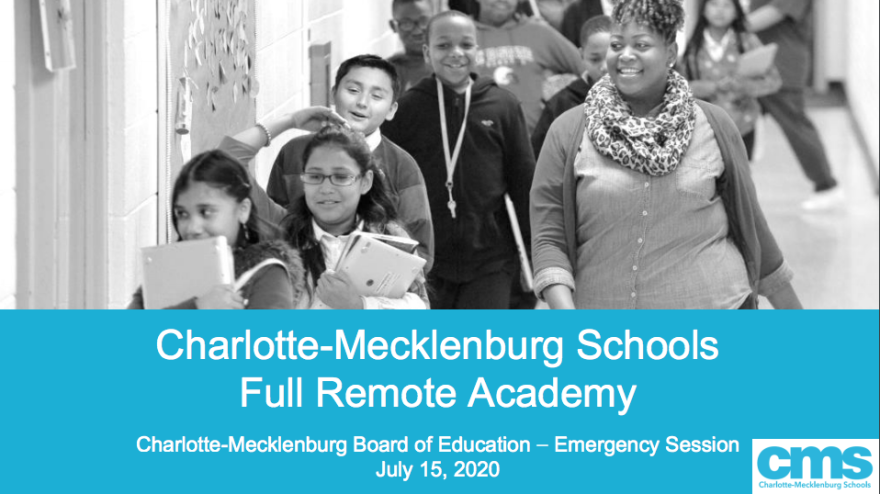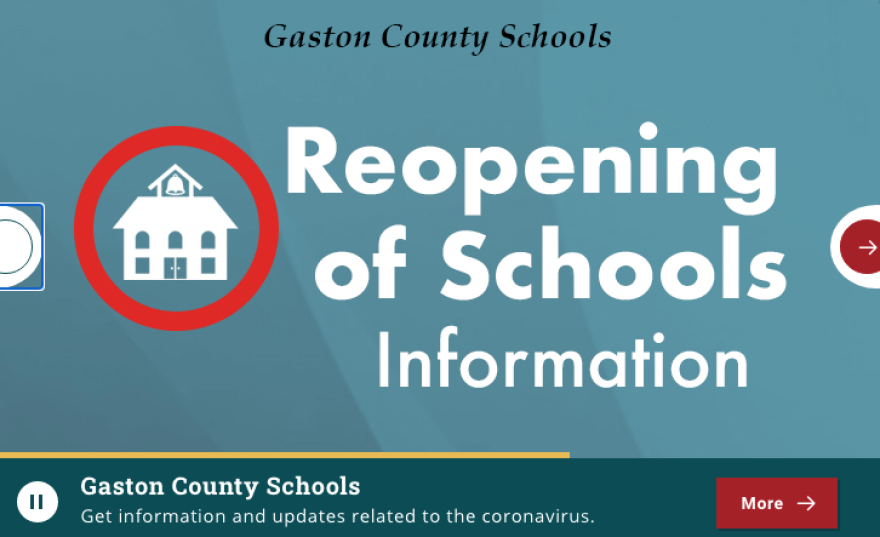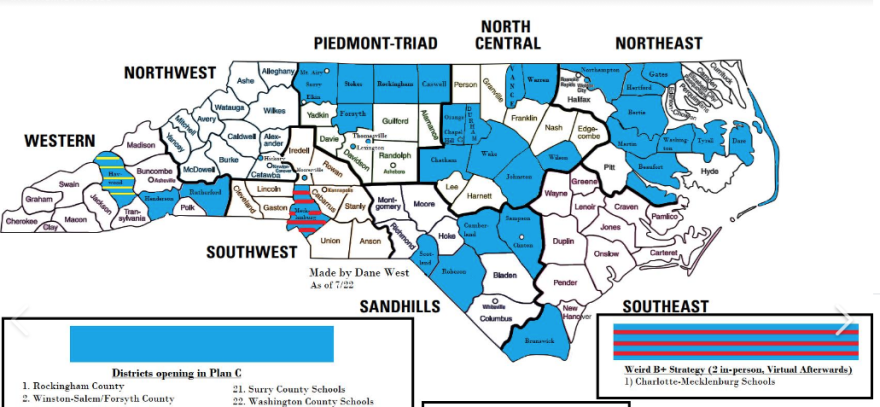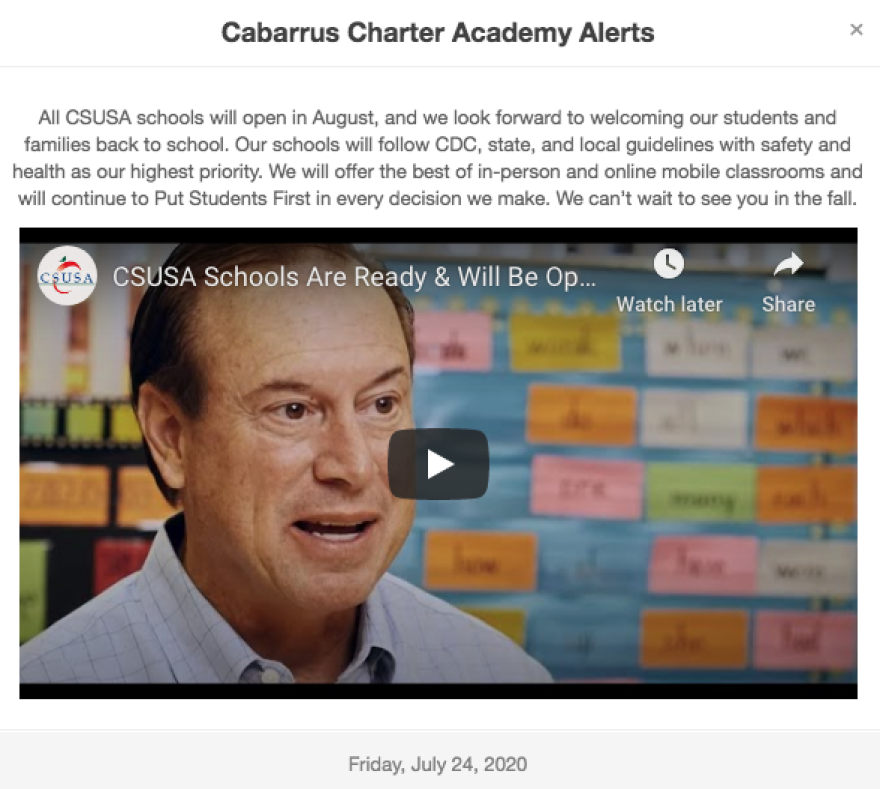A majority of North Carolina's 1.5 million public school students will begin the year learning from home.
That has become clear less than two weeks after Gov. Roy Cooper recommended that schools open in person with social distancing on Aug. 17. But all-remote remained an option, and the Cabarrus County school board's Thursday night vote to pursue that option pushed the total past 50%.
Cooper had delayed his announcement in hopes of sending as many students as possible back to in-person classes. Everyone agrees there are benefits to in-person education if it can be done safely, and Plan B option allows schools to revise schedules so classes will be small and students can sit one to a seat on buses.
The first inkling that Plan B might not be universal came last week, when Charlotte-Mecklenburg Schools voted to open remotely after a two-week in-person orientation. This week saw a cascade of Plan C remote-opening votes. Wake County had approved a Plan B last week but reversed itself this week to go remote.
The News & Observer has been tracking reopening decisions across the state. As of Thursday night, 44 school districts and 30 charter schools representing just over 49% of all students had chosen remote openings, and that was before the Cabarrus vote.
Just hit a milestone. Tonight's vote by Cabarrus County means the majority of North Carolina's K-12 public school students will use remote instruction at the start of the new school year instead of in-person classes. #nced #coronavirus https://t.co/n242povCdf
— Keung Hui (@nckhui) July 24, 2020
All-Remote Academies Add Thousands
In addition, all districts have to offer families an all-remote option. Wake County was one of the first to complete its Virtual Academy enrollment, and it had drawn almost 79,000 students when the first round closed Monday.

Most districts in the Charlotte area are still enrolling. If other districts see demand like Wake's, thousands more students in Plan B districts won't return in person.
That's despite the fact that national, state and local experts agree it's important to get students back to schoolas soon as it can be done safely. But no one knows enough about COVID-19 to lay out the exact steps and measures that make it safe.
As Independence High teacher Kristine Neale put it at Tuesday's CMS board meeting, "there are too many unanswered questions and too many horrible possibilities."
Plan B Popular In Region
Most of the districts surrounding Mecklenburg have approved Plan B in-person openings.

Gaston, Lincoln, Iredell-Statesville and Catawba County schools have announced rotations where students will be in class for two days a week and learning remotely for three days. That creates one day when schools are empty for intensive cleaning.
There’s variation even within that strategy. For instance, in Iredell-Statesville, high schools are completely remote, and in Catawba County, kindergarteners and first-graders go four days a week. And within Iredell and Catawba counties, smaller city districts have voted to open on all-remote plans.
Union County has a rotation set up where students attend school only one day a week.
COVID-19 rates are lower in the surrounding counties. Mecklenburg had 168 cases per 100,000 residents as of Friday morning, according to the state's COVID-19 dashboard. In surrounding counties rates range from 112 in Gaston County to 73 in Lincoln County.
CMS Plan Remains 'Weird'
The CMS board has taken flak from teachers for sending students back for the first two weeks when board members decided it isn't safe to keep them there.

Dane West, a Wake County history teacher who's been tracking reopening votes statewide, says CMS remains unique. He's been marking Plan C districts in blue, and he created a striped marking for CMS labeled "Weird B+ Strategy."
West laughed when asked about that label: "Because if the idea's to keep your teachers safe – and your students safe – why are you bringing them in the building?"
CMS Vice Chair Thelma Byers-Bailey says the orientations aren't trivial. She says some children must come to school, pick up their devices and get face-to-face instruction on how to use them, or they’ll be lost during remote lessons. For the kids in her district and her neighborhoods, she says, those few days of coming into schools are essential to making everything else work.
West still thinks all-remote is the safest option. But after spending hours streaming school board meetings where officials hash out their options, he agrees there are no clear solutions.
"There’s no right answer," he said. "No matter what these districts do, it’s gonna be the wrong one to a large portion of the population."
Variety In Charters, SC Schools
Charter school decisions are also mixed. Lake Norman Charter and Pine Lake Prep, two large charter schools north of Charlotte, decided this week to stay remote until at least Sept. 11.

Charter Schools USA, a national chain with seven schools in the Charlotte region, is bringing students back in person -- and using that as a marketing tool. All of their websites open with https://youtu.be/9RRtEBSrouU" target="_blank">a video of CEO John Hage touting the in-person option.
One parent who had applied to Cabarrus Charter Academy but didn't register her child got a follow-up email after CMS voted to go remote. The header: "Looking for In-Person Instruction for 2020-2021? Cabarrus Charter Academy has it!"
South Carolina's governor there urged districts to give families a choice between full-time, in-person classes or an all-remote academy. But two districts in the Charlotte area -- Fort Mill and Rock Hill – disregarded that suggestion. Instead, they’re doing something similar to North Carolina’s Plan B, with staggered schedules for in-person classes.
Fort Mill also delayed its opening date to Aug. 31 to allow more time for preparation.
North Carolina districts can't delay their opening, because the General Assembly mandated an Aug. 17 opening.
In-Person Openings Pose Questions
The students who actually get on a bus and report to school that day may be relatively small, but they'll be the first to see what a dramatically different approach to education looks like.
Plan B districts have to figure out how to run buses with one student per seat. Some near Charlotte have doubled their routes.
They have to set up temperature screenings, figure out how to safely isolate students who show up with a fever or COVID-19 symptoms and get them sent home safely.
They must redesign cafeterias and classrooms to avoid students crowding together and breathing on each other. Some districts say students will eat "grab and go" lunches in classrooms. At one point, news reports said Fort Mill planned to install Plexiglas barriers around elementary school desks if they couldn't be safely distanced.
And whatever approach is being used for classes, students and families are anxiously waiting to see how districts will handle sports, band and other extracurricular activities.
Click here for the latest coronavirus news on WFAE’s live blog.
Sign up here for The Frequency, WFAE’s daily email newsletter.
What questions do you have about the coronavirus? What has this experience been like for you? Share your questions below.
_




